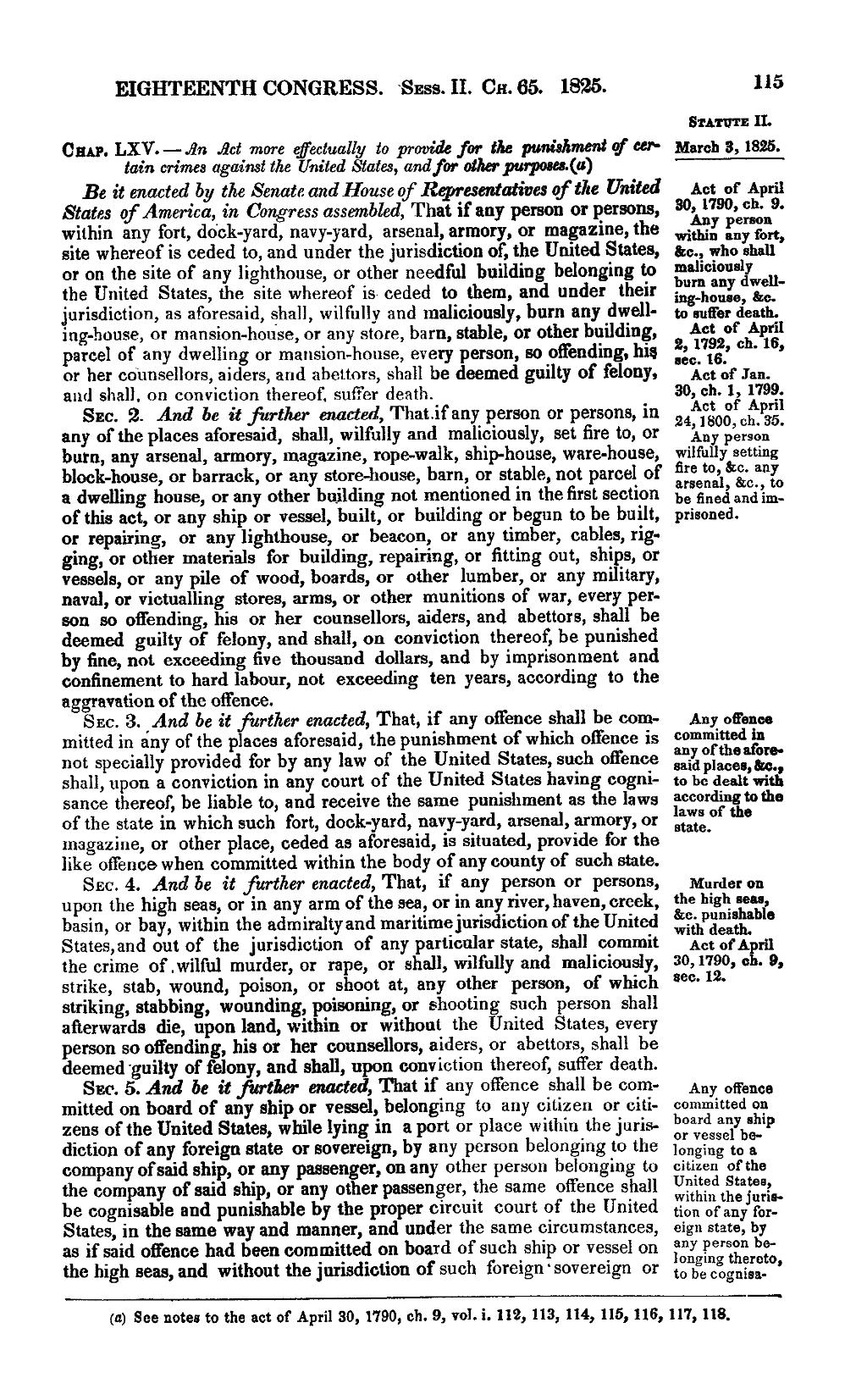Statute ⅠⅠ.
Chap. LXV.—An Act more effectually to provide for the punishment of certain crimes against the United States, and for other purposes.[1]
Act of April 30, 1790, ch. 9.
Any person within any fort, &c., who shall maliciously burn any dwelling-house, &c. to suffer death.
Act of April 2, 1792, ch. 16, sec. 16.
Act of Jan. 30, ch. 1.
Act of April 24, 1800, ch. 35.
Any person wilfully setting fire to, &c. any arsenal, &c., to be fined and imprisoned.Be it enacted by the Senate and House of Representatives of the United States of America in Congress assembled, That if any person or persons within any fort, dock-yard, navy-yard, arsenal, armory, or magazine, the site whereof is ceded to, and under the jurisdiction of, the United States, or on the site of any lighthouse, or other needful building belonging to the United States, the site whereof is ceded to them, and under their jurisdiction, as aforesaid, shall, wilfully and maliciously, burn any dwelling-house, or mansion-house, or any store, barn, stable, or other building, parcel of any dwelling or mansion-house, every person, so offending, his or her counsellors, aiders, and abettors, shall be deemed guilty of felony, and shall, on conviction thereof, suffer death.
Sec. 2. And be it further enacted, That if any person or persons, in any of the places aforesaid, shall, wilfully and maliciously, set fire to, or burn, any arsenal, armory, magazine, rope-walk, ship-house, ware-house, block-house, or barrack, or any store-house, barn, or stable, not parcel of a dwelling house, or any other building not mentioned in the first section of this act, or any ship or vessel, built, or building or begun to be built, or repairing, or any lighthouse, or beacon, or any timber, cables, rigging, or other materials for building, repairing, or fitting out, ships, or vessels, or any pile of wood, boards, or other lumber, or any military, naval, or victualling stores, arms, or other munitions of war, every person so offending, his or her counsellors, aiders, and abettors, shall be deemed guilty of felony, and shall, on conviction thereof, be punished by fine, not exceeding five thousand dollars, and by imprisonment and confinement to hard labour, not exceeding ten years, according to the aggravation of the offence.
Any offence committed in any of the aforesaid places, &c., to be dealt with according to the laws of the state.Sec. 3. And be it further enacted, That, if any offence shall be committed in any of the places aforesaid, the punishment of which offence is not specially provided for by any law of the United States, such offence shall, upon a conviction in any court of the United States having cognisance thereof, be liable to, and receive the same punishment as the laws of the state in which such fort, dock-yard, navy-yard, arsenal, armory, or magazine, or other place, ceded as aforesaid, is situated, provide for the like offence when committed within the body of any county of such state.
Murder on the high seas, &c. punishable with death.
Act of April 30, 1790, ch. 9, sec. 12.Sec. 4. And be it further enacted, That, if any person or persons, upon the high seas, or in any arm of the sea, or in any river, haven, creek, basin, or bay, within the admiralty and maritime jurisdiction of the United States, and out of the jurisdiction of any particular state, shall commit the crime of wilful murder, or rape, or shall, wilfully and maliciously, strike, stab, wound, poison, or shoot at, any other person, of which striking, stabbing, wounding, poisoning, or shooting such person shall afterwards die, upon land, within or without the United States, every person so offending, his or her counsellors, aiders, or abettors, shall be deemed guilty of felony, and shall, upon conviction thereof, suffer death.
- ↑ See notes to the act of April 30, 1790, ch. 9, vol. i. 112, 113, 114, 115, 116, 117, 118.

